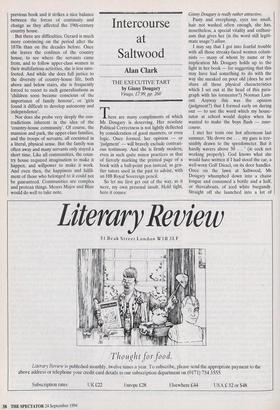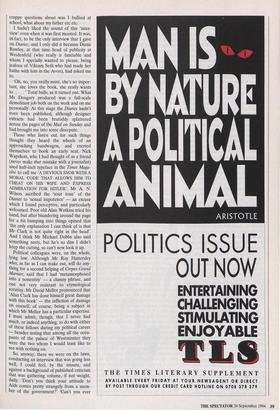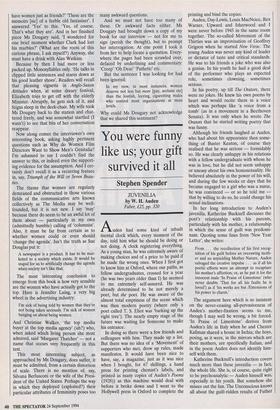Intercourse at Saltwood
Alan Clark
THE EXECUTIVE TART by Ginny Dougary Virago, £7.99, pp. 260 There are many compliments of which Ms Dougary is deserving. Her resolute Political Correctness is not lightly deflected by consideration of good manners, or even logic. Once formed, her opinion — or `judgment' — will bravely exclude contrari- ous testimony. And she is firmly modern; even in such quite minor practices as that of fiercely marking the printed page of a book with a ball-point pen instead, as gen- tler tutors used in the past to advise, with an HB Royal Sovereign pencil. , So let me first get out of the way, as it were, my own personal insult. Hold tight, here it comes: Ginny Dougary is really rather attractive.
Pasty and overplump, eyes too small, hair not washed often enough, she has, nonetheless, a special vitality and enthusi- asm that gives her (is the word still legiti- mate usage?) allure.
I may say that I got into fearful trouble with all those streaky-faced women colum- nists — many of whom by name or by implication Ms Dougary holds up to the light in her book — for suggesting that this may have had something to do with the way she sneaked on poor old (does he not share all those physical characteristics which I set out at the head of this para- graph with his tormentor?) Norman Lam- ont. Anyway this was the opinion (judgment?) that I formed early on during our — to use the word which my house- tutor at school would deploy when he wanted to make the boys flush — inter- course.
I met her train one hot afternoon last summer. 'He drove me . . . my gaze is irre- sistibly drawn to the speedometer. But it hardly wavers above 50 . . . ' (ie cock not working properly). God knows what she would have written if I had stood the car, a well-worn Golf Diesel, on its door handles. Once on the lawn at Saltwood, Ms Dougary whumphed down into a chaise longue and consumed a bottle and a half, or thereabouts, of iced white burgundy. Straight off she launched into a lot of crappy questions about was I bullied at school, what about my father etc etc.
I hadn't liked the sound of this 'inter- view' even when it was first mooted. It was, in fact, to be the only interview that I gave on Diaries, and I only did it because Diane Rowley, at that time head of publicity at Weidenfeld (who really is fanciable and whom I specially wanted to please, being jealous of Vikram Seth who had made her bathe with him in the Avon), had asked me to.
`Oh, no, you really must, she's so impor- tant, she loves the book, she really wants to . . . . ' Total balls, as it turned out. What Ms Dougary produced was a full-scale demolition job both on the work and on me personally. At this stage the Diaries hadn't even been published, although designer extracts had been brutishly splattered across the pages of the Mail on Sunday and had brought me into some disrepute.
Those who listen out for such things thought they heard the wheels of an approaching bandwagon, and exerted themselves to book an early seat. Nick Wapshott, who I had thought of as a friend (never make that mistake with a journalist) used half-inch typeface in the Times Maga- zine to call me 'A DEVIOUS SNOB WITH A
MORAL CODE THAT ALLOWS HIM TO
CHEAT ON HIS WIFE AND EXPRESS ADMIRATION FOR HITLER'. Mr A. N.
Wilson ascribed the 'sour tone' of the Diaries to 'sexual impotence' — an excuse which I found perceptive, and particularly welcomed. Poor old Alan Watkins tried his hand, but after blundering around the page for a bit bumping into things opined that `the only explanation I can think of is that Mr Clark is not quite right in the head'. And I think Mr Michael Dobbs also said something nasty, but he's so dim I didn't keep the cutting, so can't now look it up.
Political colleagues were, on the whole, lying low. Although Mr Roy Hattersley who, as far as I can make out, will do any- thing for a second helping of Crepes Grand Marnier, said that I had 'metamorphosed into a nonentity' — a clumsy phrase, and one not very resistant to etymological scrutiny. Mr David Mellor pronounced that `Alan Clark has done himself great damage with this book' — the infliction of damage on oneself, of course, being a subject in which Mr Mellor has a particular expertise. I must admit, though, that I never had much, or indeed anything, to do with either of these fellows during my political career — besides noting that among all the occu- pants of the palace of Westminster they were the two whom I would least like to see with nothing on. So, anyway, there we were on the lawn, conducting an interview that was going less well, I could feel, by the minute, and against a background of published criticism that was gathering volume, if not weight, daily. 'Don't you think your attitude to Aids comes pretty strangely from a mem- ber of the government?' Can't you ever have women just as friends?' These are the memoirs [sic] of a feeble old fantasiser'. I answered 'Yes' to this. 'Yes, of course. That's what they are'. And in her finished piece Ms Dougary said, 'I wondered for one brief moment whether Clark had lost his marbles?' (What are the roots of this curious phrase, I ask myself?) Anyway, she must have a drink with Alan Watkins.
Because by then I had more or less packed up. Monosyllables only. 'He talks in clipped little sentences and stares down at his good leather shoes'. Readers will recall that pleasing vignette in Anglo-Saxon Attitudes when, at some dreary festival, Elizabeth tries to get off with the elderly Minister. Abruptly, he gets sick of it, and feigns sleep in the deck-chair. My wife took Ms Dougary back to the station and chat- tered freely, and was somewhat startled (I wasn't) to see that bits of her conversation reappear.
Now along comes the interviewer's own interesting book, asking highly pertinent questions such as Why do Women Film Directors Want to Show Men's Genitalia? I'm ashamed to say I couldn't find the answer to this, or indeed even the support- ing evidence for the assumption. And I cer- tainly don't recall it as a recurring feature in, say, Triumph of the Will or Seven Beau- ties.
The theme that women are regularly demeaned and obstructed in those various fields of the communicative arts known collectively as The Media may be well- founded, but it is not new. I say 'may' because there do seem to be an awful lot of them about — particularly in my own (admittedly humble) calling of 'columnist'. Also, it must be far from certain as to whether women could or even should `change the agenda'. Isn't the truth as Sue Douglas put it:
A newspaper is a product. It has to be mar- keted to a society which exists. It would be stupid for us to artificially change the agenda when society isn't like that.
The most interesting conclusion to emerge from this book is how very sensible are the women who have actually got to the top. Here is Jennifer Laing, a very big wheel in the advertising industry: I'm sick of being told by women that they're not being taken seriously. I'm sick of women banging on about being women.
And Christine Walker, 'the top media buyer at the top media agency' (uh?) who, when asked which living person she most admired, said 'Margaret Thatcher' — not a name that occurs very frequently in this text.
This most interesting subject, as approached by Ms Dougary, does suffer, it must be admitted, from a certain distortion of scale. There is no mention of, say, Silvana Berlusconi or the wife of the Presi- dent of the United States. Perhaps the way in which they deployed (exploited?) their particular attributes of femininity poses too many awkward questions.
And we must not have too many of these. Or awkward facts either. Ms Dougary had brought down a copy of my book for our interview — not for me to sign (perish the thought), but to prompt her interrogation. At one point I took it from her to help locate a quotation. Every- where the pages had been scrawled over, defaced by underlining and commentary: `Creep' Oh Dear' Pathetic' etc.
But the sentence I was looking for had been ignored: In my view, in most instances, women deserve not less but more [pay, acclaim etc] than the loutish, leering, cigaretting males who control most organisations at most levels.
Why could Ms Dougary not acknowledge that we shared this sentiment?




































































 Previous page
Previous page